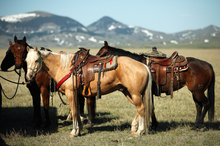Back Country Horsemen of America formed over 40 years ago to protect our right to ride horses on public lands. The original founders cherished the wide swaths of wild land that encompass hundreds of thousands of acres with trails inaccessible to nearly anything but those on foot or hoof.

Maintaining horse trails
Front country horse trail gems may not sit on mountaintops, but they still need consistent maintenance due to the heavy use we give them.
Today, we still treasure those vast areas, but we also highly value the smaller public lands nestled between cities and highways, the few hundreds or thousands of acres that give us a respite from our busy daily life.
These front country gems may not sit on mountaintops where the worst of weather pulls down trees and washes out trail treads, but they still need consistent maintenance due to the heavy use we give them. In fact, this is a strong argument for creating more local public lands.
Easy accessibility to the few that we have attracts recreationists of every kind, including hikers, dog walkers, bicyclists, equestrians, and more, in numbers higher than most lands can sustain. Instead of limiting use at individual public lands, creating more recreation opportunities would spread our use across more lands.
Back Country Horsemen chapters across the nation carefully plan their resources to attend to the places with the highest needs and the heaviest use first. At least once yearly, the Olympic Chapter of Back Country Horsemen of Washington reviews its work budget to determine where its effort is most badly needed.
Members realized that they tend to return to Green Mountain Horse Camp in Green Mountain State Forest several times each year to repeatedly perform the same repairs. To reduce this inefficient use of their limited time, the chapter decided to overhaul the horse corrals, the biggest maintenance need in the camp.
A big job maintaining horse corrals
The land surrounding the popular corrals collected rainwater, making the corral area muddy and difficult for campers to clean, and the wood rails had rotted from exposure to the elements.
To overhaul the corrals, the Olympic Chapter drew on the skill within their membership: landscape designer Brian Sundberg created the plan, former Chapter President Jim Davis served as liaison and procured materials, past BCHA Chair Jim Murphy wrote up the specifications, and other chapter members provided tools, equipment (including a Bobcat), hard work, and rations.
Chapter volunteers began by removing all the soft and rotten posts and rails. To reduce the level of maintenance required after renovation, they hardened the corral footing, which would allow water to drain away while providing a firm surface that would be easier to keep clean.
After excavating the 100-foot-by-30-foot footprint of the corral area about 8 inches deep, they installed a drainpipe system to carry water away from the camp, then filled in the area with crushed rock. They then installed corral posts and rails, using pressure treated and metal materials for durability.
An expensive job
Anyone who has done landscaping or similar construction knows that these materials aren’t cheap, making a project like this pricey, even when the labor is free. Including over $6000 for footing materials, nearly $2000 for weather-durable gates and posts, and over $500 for heavy equipment fuel along with other miscellaneous costs, the final price tag came to almost $10,000 for the sixteen 12-foot-by-12-foot corrals.
The state Department of Natural Resources (DNR) donated the pressure treated posts and rails, but the rest of the cost was carried by the Olympic Chapter Back Country Horsemen. How did they do it?
They organize the Western Dream Ride at a dude ranch in the stunning Cascade Mountains. Horse lovers spend three days living in rustic ranch cabins, eating authentic back country meals, and riding amazing trails. The Olympic Back Country Horsemen also provide western style entertainment, Cowboy Church, a silent auction, and even a swimming pool.
Offering this well-loved event to up to 130 riders every year takes the full commitment of the entire chapter, but participants and volunteers know that it makes funds available to perform maintenance and improvements to trails, trailheads, and camps in Green Mountain State Forest.
Horse trails - A job worth every effort
Although northwest Washington boasts many horse trails that traverse its awe-inspiring mountains, riders still enjoy front country trails for day rides and when mountain trails are closed.
Managed by the state DNR, Green Mountain State Forest is an undeveloped working land that provides habitat for native plants and animals, water retention, and water quality benefits. Its 6,000 acres provide diverse recreation opportunities to more than 150,000 people each year.
The Olympic Chapter has a volunteer contract with the DNR to maintain the trails and the horse camp. As part of the contract, the chapter also provides a friendly Camp Host at the horse camp on weekends from Memorial Day weekend through Labor Day.
When recreational trail riders started using the horse corrals renovated by the Olympic Chapter Back Country Horsemen, compliments and rave reviews began coming in. People love the new corrals as well as the minor repairs and grooming the chapter completed on the 17 camp sites.
About Back Country Horsemen of America
BCHA is a non-profit corporation made up of state organizations, affiliates, and at-large members. Their efforts have brought about positive changes regarding the use of horses and stock in wilderness and public lands.
If you want to know more about Back Country Horsemen of America or become a member, visit their website: www.bcha.org; call 888-893-5161; or write 342 North Main Street, West Hartford, CT 06117. The future of horse use on public lands is in our hands!
Article by Sarah Wynne Jackson
